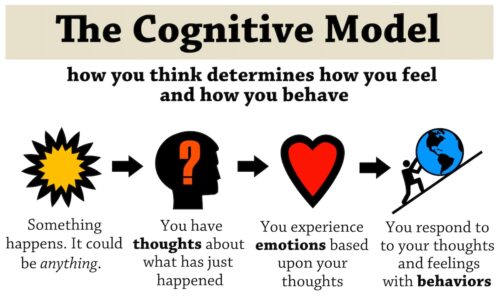Your thinking can propel you forward, immobilize you, and/or steer you into conflict. Your cognitions (thinking, perceptions, and beliefs) play an instrumental role in emotion, behavior, self-esteem, self-efficacy, body image, body weight, relationships, and much more. This blog deals with cognitive distortions and self-sabotage.
Cognitive Distortions
Your thinking doesn’t happen in a vacuum; it’s the igniting force behind your emotions and behaviors. For instance, experiencing an unpleasant emotion, such as sadness, may be the result of thinking about a person you lost. This is a normal reaction to loss. However, going from sadness to a full-blown depressive episode that lasts over a year may be an extreme and maladaptive reaction to loss. Long-lasting and recurring depressive negative thoughts are unhealthy and the result of cognitive distortions.

Cognitive distortions are also referred to as unhelpful/unhealthy thoughts or distorted thinking. Cognitive distortions are based on distorted beliefs, experiences, and views of the world, others, and ourselves. Distorted thinking is unhelpful thinking patterns that convince your mind of things that aren’t really true.
These inaccurate thoughts are not rational and have a negative impact on your emotional state and daily choices. These unhelpful/unhealthy thought patterns develop over the years and become your habitual way of thinking. Over time, they show up automatically as a knee-jerk reaction.
Types of Cognitive Distortions
Cognitive distortions reinforce negative thinking and keep you in a bad emotional space. Everyone experiences unhelpful thoughts to some degree. However, having cognitive distortions running through your head consistently and reacting to life based on them can lead to emotional distress, chaotic relationships, and self-sabotage.

Here are some of the most common cognitive distortions:
- Polarized Thinking (Black-or-White Thinking): Seeing things only in extremes and placing people or situations in “either/or” categories, with no shades of gray. This thinking sees only perfection or failure, no middle ground. An example of polarized thinking is when Mary doesn’t stick to her diet during lunch and then decides to have an unhealthy dinner – She thinks that since one meal was ruined, the meal plan for the whole day is already messed up.
- Catastrophizing: This is when someone encounters a situation he/she dislikes, then he/she concludes that the situation is worse than what it actually is, acting as if it’s the end of the world. Let’s say Mike gets into a fight with his girlfriend about something insignificant; then, he proceeds to say that they should break up because things are a disaster and his girlfriend will probably leave him anyway.
- Filtering: Only paying attention to a certain input. For instance, Clara’s boss gave her a performance review mentioning her strengths and shortcomings. After the meeting, she kept thinking and talking to others about how her boss was putting her down. Yet, she fails to mention that her boss also discussed her strengths.
- Emotional Reasoning: Concluding that feeling a certain way makes something true automatically and unconditionally. Emotional reasoning is when a person’s emotions take over her/his thinking entirely, excluding rationality and logic. Those caught up in this distorted thinking need to remember that feelings are not facts.
- Disqualifying Positives: Here a person discounts good things that happen and zeroes in bad aspects of a situation, the self, or another person. This keeps people in a negative space and facilitates a victim mentality.
- Over-Generalizing: This is when someone draws broad conclusions based on a single event. For instance, Paula had an unpleasant interaction with a co-worker and she proceeded to conclude that bad things always happen to her and that everybody is always picking on her.
- Labeling: Here a person assigns labels and generalizes one or two qualities into a negative global judgment about him/herself, others, or situations. For instance, Perry gets a bad grade and decides to conclude that he is a failure or he gets robbed and proceeds to conclude that most people are evil.

- Personalization: Believing that everything others do or say is a direct reaction to you, taking everything personally. Or assuming more responsibility than what’s appropriate regarding a specific situation. The opposite is also part of personalization, refusing to take responsibility for your role in a situation and blaming others.
- Regular Use of Critical Words: Habitually using words like should, must, ought. This creates rigid rules, unrealistic expectations, and frustration when dealing with the world, others, or the self.
- Jumping to Conclusions: Concluding that whatever you believe is true just because you think so, without having all the facts to draw that conclusion.
- Mind-Reading: Believing that you know how others feel, think, and why they do what they do without specific evidence.
- Fortune-Telling: This is when people talk about the future or an upcoming situation as if they can predict it, or as if they know what will transpire.
- Control Fallacies: This distortion involves issues of control. Someone may feel externally controlled as if she/he has no control over her/his life and is a helpless victim of fate. Some may believe that they are overweight because it’s in their genes. The opposite of this fallacy involves internal control. This is when one believes that he/she has control over everything happening in your life and the lives of others.
- Fallacy of Fairness: In the fallacy of fairness, someone goes through life applying a measuring ruler against every situation, judging its fairness. This leaves him feeling resentful, angry, and even hopeless because he tends to conclude that life is not fair.
- Blaming: This is when someone holds other people responsible for her emotional pain. Or she may take the opposite track and blame every problem on her — even things that are clearly outside of her control.
Becoming aware of the most common cognitive distortions can help you identify those thinking patterns that may be harming you. Recognizing the types of “stinking thinking” that have become part of your cognition and mindset can help you challenge these unhelpful/unhealthy thoughts, and subsequently change your emotions and reactions.
Self-Sabotage
One consequence of continuing to engage in cognitive distortions is self-sabotage. This is when one behaves in ways that are damaging to his/her well-being. Self-sabotage creates problems in relationships and daily situations, and interferes with long-standing goals. Many times, people aren’t aware of their self-sabotaging patterns and self-defeating consequences. Other times, they are in denial about it.
The most common forms of self-sabotage include procrastination, alcohol or drug abuse, binge eating, initiating fights in relationships, and missing important appointments. Being aware of self-sabotage doesn’t always guarantee that a person will disengage from those patterns. However, it is possible to overcome self-sabotage by addressing their cognitive distortions, incorporating cognitive reframing, developing coping skills and resilience, and dealing with emotional issues and unhealthy habits.
In Summary
Healthy thinking is a prerequisite to positive emotional responses, healthy behaviors, satisfying relationships, and a fulfilling life. The goal is to identify any distorted thinking pattern present so you can challenge it and change it. As a consequence, you would be able to avoid unnecessary negative emotions and unhealthy behaviors, and stop self-sabotage. Check out 28 Days to a New Life to incorporate a holistic approach and make changes in all areas of your life.
To a Fitter Healthier You,
The Fitness Wellness Mentor



